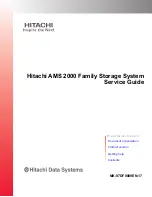
Network Adapter
Network Adapter
Network Adapter
Network Adapter
Teaming with Windows
Teaming with Windows
Teaming with Windows
Teaming with Windows
Server 2003
Server 2003
Server 2003
Server 2003
Windows Server 2003 supports NCU, NIC Configuration Utility. This is the same NCU that is available to
Proliant customers. This NCU has been ported to 64 bit Windows Server 2003 and is included with every
SmartSetup CD that comes with a Windows partition on Integrity Superdome.
All ProLiant Ethernet network adapters support the following three types of teaming:
NFT—Network Fault Tolerance
TLB—Transmit Load Balancing
SLB—Switch-assisted Load Balancing
For Windows Server 2003, Datacenter edition on Superdome, there are four network interface cards that
are currently supported (thus, these are the only cards that can be teamed with this NCU):
Windows/Linux PCI 1000Base-T Gigabit Ethernet Adapter (Copper)
A7061A
Windows/Linux PCI 1000Base-SX Gigabit Ethernet Adapter (Fiber)
A7073A
Windows/Linux PCI 2 port 1000Base-T Gigabit Ethernet Adapter (Copper)
A9900A
Windows/Linux PCI 2 port 1000Base-T Gigabit Ethernet Adapter (Fiber)
A9899A
Also, note that teaming between the ports on a single A9900A or A9899A above is supported by the
NCU.
Red Hat RHEL AS 3 and
Red Hat RHEL AS 3 and
Red Hat RHEL AS 3 and
Red Hat RHEL AS 3 and
SUSE SLES 9
SUSE SLES 9
SUSE SLES 9
SUSE SLES 9
Support of Serviceguard and Cluster Extension on Red Hat RHEL AS 3 and SUSE SLES 9 should be
available in late 2004 or early 2005.
Management Features
Management Features
Management Features
Management Features
Integrity Superdome now supports the Console and Support Management Station in one device.
Service Processor
Service Processor
Service Processor
Service Processor (MP)
The service processor (MP) utility hardware is an independent support system for nPartition servers. It
provides a way for you to connect to a server complex and perform administration or monitoring
tasks for the server hardware and its nPartitions. The main features of the service processor include the
Command menu, nPartition consoles, console logs, chassis code viewers, and partition Virtual Front
Panels (live displays of nPartition and cell states).
Access to the MP is restricted by user accounts. Each user account is password protected and provides a
specific level of access to the Superdome complex and service processor commands. Multiple users can
independently interact with the service processor because each service processor login session is private.
Up to 16 users can simultaneously log in to the service processor through its network (customer LAN)
interface and they can independently manage nPartitions or view the server complex hardware states.
Two additional service processor login sessions can be supported by the local and remote serial ports.
These allow for serial port terminal access(through the local RS-232 port) and external modem access
(through the
remote RS-232 port).
In general, the service processor (MP) on Superdome servers is similar to the service processor on other
HP servers, while providing enhanced features necessary for managing a multiple-nPartition server. For
example, the service processor manages the complex profile, which defines nPartition configurations as
well as complex-wide settings for the server. The service processor also controls power, reset, and TOC
capabilities, displays and records system events (chassis codes), and can display detailed information
about the various internal subsystems.
QuickSpecs
HP Integrity Superdome Servers 16-socket, 32-socket,
HP Integrity Superdome Servers 16-socket, 32-socket,
HP Integrity Superdome Servers 16-socket, 32-socket,
HP Integrity Superdome Servers 16-socket, 32-socket,
and 64-socket
and 64-socket
and 64-socket
and 64-socket
Configuration
DA - 11717 Worldwide — Version 20 — May 3, 2005
Page 16
















































